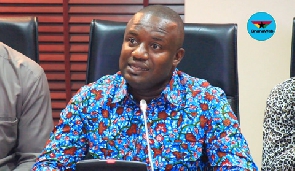Massachusetts Daily Collegian
School of Management group spends month in foreign land
Amherst (Massachusetts) -- Despite sweltering in a sauna-like room, crammed next to his compatriots like the friendliest of sardines on the compound floor, Michael Alden was just about to drift off to sleep.
A rainbow-striped lizard, caught in the corner of his eye, eliminated any chance he would receive any slumber, at least for the next half hour.
Alden recounted the reptile as one of the more interesting things to occur on his School of Management group's recent expedition over winter break.
Thousands of miles away from Amherst, a nation gleaming with hot sun, a beautiful coastline and welcoming people seems like the ideal getaway for any college student in January. But you won't find synopses like these of a country in any Fodor's guide, or discounts on airfare and hotels at your local travel agency.
The destination was Ghana, a tiny West African nation nestled between the Ivory Coast and Togo. While the coastal land might not be your typical vacation spot, these University of Massachusetts undergraduates returned home with more than just a good suntan.
"The students came back with appreciation for other cultures, and a newfound confidence in themselves," said Dennis Hanno, associate dean at SOM and leader of the student group.
Now in its third year traveling to Ghana, the program and the students in it present educational seminars on sound business skills and computer training to the people of Sekondi, the country's third-largest city.
Prior to leaving on the transatlantic journey, the 11 students, accompanied by two UMass alumni, split into four teams. They prepared extensive seminars on marketing, management, accounting, and economics and personal finance. Many of the inhabitants of Sekondi, a massive, spread-out city with a population nearing one million, either own tiny businesses or had been looking to open up a shop of their own. The SOM contingent presented skills relevant to the citizens' everyday lives, such as how to develop a means of income, and proper assets management.
Adjusting to differences
The members knew that the trip would be like entering a completely different world, but there was little that could prepare them for what they would soon experience.
"They couldn't have briefed you enough," said John Collmer, a senior accounting major. "From the moment you get off the plane, you're taken from an industrial nation to a pre-industrial nation."
Making the adjustment to a completely different lifestyle began even before the team departed. Each member received seven shots prior to departure to prevent disease and was advised on what to expect upon arrival.
Still, adjusting to the conditions was difficult. Heat rash and inflamed mosquito bites afflicted the team, and each person carried self-filtering water bottles or bought water sold in sandwich bags. On several occasions, group members ran out of water completely, said Alden, a junior marketing major. The entire team was also required to take pills that prevented malaria, which Alden said caused many hallucinations at night.
Sekondi also doesn't have many of the modern advantages that our nation takes for granted, such as medical facilities and waste removal systems.
Not exactly your typical winter vacation.
A welcoming feeling
The people of Sekondi have extremely limited phone access and probably couldn't tell you what a Big Mac tastes like. Alden said that they have few imported goods from the industrialized world, except for automobiles, Guinness, Coca-Cola and Marlboro cigarettes. The team saw families living in shacks and crumbling buildings all around the city.
Whatever the city lacks financially, it more than compensates with its generous, hospitable spirit.
Whether it was the American-style foods (such as spaghetti, rice, etc.) prepared during meals, or simply the deep gratitude the citizens showed toward their visitors, those in Ghana left a lasting impression on their visitors from the United States.
"It's a place where you learn about the word 'thanks,'" Collmer said. "They have more sense of appreciation than you could ever imagine." He said that the people in Ghana are deeply grateful at something as commonplace as holding a door for another.
The compound where the team lodged also did its best to make the group feel welcome. Aside from the aforementioned lizard and the occasional spider creeping its way up the wall, the sleeping conditions were "modest, yet very comfortable," said Hanno.
With three years of Army experience, sleeping in tight quarters was nothing new for Collmer.
"You're not in the Hilton," he said. "But the beds were more comfortable than my dorm room."
Growing closer
When not coaching the citizens on proper business strategies, however, the group was able to relax and develop friendships with the townspeople, especially the younger citizens.
Several of the team members discarded their white polo shirts and khakis for more athletic wear, playing soccer and basketball in the city streets with the citizens. Hanno laughs when remembering previous UMass groups traveling over to Ghana. The program, started by the nursing program at UMass, originally sent almost exclusively female students to the country, so there was little interaction between the two sides athletically. Now, he says, with an equal distribution of gender, the young boys of Sekondi can display their athletic prowess against the Americans.
Alden said that it was evident how strongly the people of Ghana have incorporated Christianity into their daily lives. He remembers how signs on the street display Biblical passages, and town businesses have names such as the "God is With Us" fruit stand. He also recalled an instance in which he asked a group of townspeople to pick a presentation topic on PowerPoint, and they answered with the story of Moses.
The Ghana trip has developed into a bigger success each year, largely because the city welcomes UMass back with open arms. Hanno received 30 applications from students in September, more than he had seen in any of the previous trips. He hopes that next January he will be able to take as many as 20 students back to Ghana.
Making a difference
During the first trip, Hanno and the School of Management built a computer center at the Assemblies of God church in the city. The center has helped train over 100 residents of Sekondi in computing and typing skills.
Hanno continues to bring over new computers each year. The people of Sekondi have a "thirst for knowledge," Hanno said, and that the center has created excitement in their city. He also said that the point of the SOM's journeys never had anything to do with helping the poverty-stricken.
"We never built it as a Peace Corps, 'save the world' type of trip," Hanno said. "They're probably happier than [we] are."
He added that when talking with students from Ghana that have attended UMass, he sometimes has to be corrected when talking about the journey, as the students tell him that "you're not going to Africa, you're going to Ghana."
"They have a lot of pride," Hanno said.
Gaining a different perspective
The team agreed that traveling to Ghana was a mind-blowing experience, but that the culture wasn't that much different from the United States.
"The only culture shock is perhaps an understanding of how easy it is to fit in different cultures," Hanno said.
Alden agreed, saying that the people are extremely friendly and warm despite not having the facilities we use each day in our daily lives.
"They don't know any better, so they're satisfied with their way of life," he said.
And that's something he can take with him to bed each night. Minus the lizards, of course.
The following 11 students represented the School of Management on the trip to Ghana:
Michael Alden, junior, Marketing. Danielle Angus, junior, Marketing. Matthew Charest, junior, Marketing. John Collmer, senior, Accounting. Meredith McLane, sophomore, School of Management. Mindy Nyman, senior, Accounting. Alexis Petrello, junior, School of Management. David Soffer, senior, Operations Management. Michelle Turk, senior, Accounting. Rachael A. Wade, junior, Marketing. Jason Wass, senior, Finance.


















